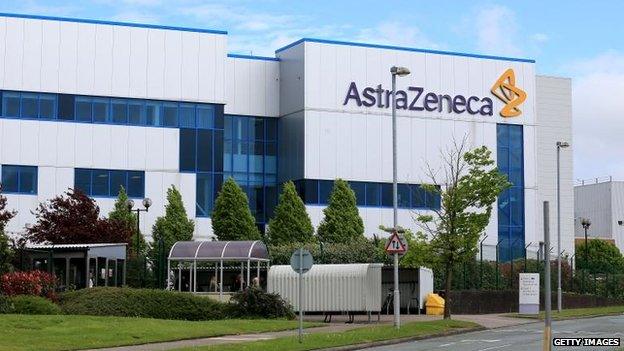Key investor Neil Woodford backs AstraZeneca board
- Published
- comments

With AstraZeneca's share price drifting down again this morning, the company's board know that the next stage of its turnaround will be all about delivery.
As part of their successful defence against Pfizer, the business presented bold decade-long forecasts about their drugs development - the now famous "pipeline".
In the next five to 10 years those treatments for diabetes, cardio-vascular diseases and cancer will have to be approaching the market and showing revenue returns.
Investors are split over whether AstraZeneca's rapid rejection of each of Pfizer's advances were handled in the right way. Some, Like Axa and Jupiter, believe that the British-Swedish firm should have spoken in greater detail to their shareholders. One source close to Pfizer told me that AstraZeneca's share price would not see £55 (the final offer from the US business) "for a decade".
'Significant risks'
Others take the opposing view. Neil Woodford, who launched Woodford Investment Management (WIM) after a long and much lauded career at Invesco Perpetual, is one of the UK's most influential fund managers. As a major shareholder in BAE, he was instrumental in blocking its merger with the European aircraft giant, EADS.
Woodford is a major shareholder in AstraZeneca, and played a leading role in bringing in the present chief executive, Pascal Soriot, after criticism that the business was underperforming. Woodford has now revealed that he is fully behind the AstraZeneca board.
"I will make more money for my investors by AstraZeneca remaining independent," Mr Woodford told me. "I could not see how one-plus-one [Pfizer and AstraZeneca merging] would create synergies and there are significant execution risks.
"What concerned me [about Pfizer] was their history. It would have been a business with a far less attractive pipeline [of drug developments]. Pascal Soriot has transformed this business. If he can do that in two years, what could he do in a longer time frame?"
Mr Woodford's words will be heartening for AstraZeneca's board. Some of the headlines this morning on the probable end of the deal are pretty critical - the Financial Times reports , external"recriminations flying" and the Times says, external investors have "attacked AstraZeneca". On the other side, Alistair Osborne, also in the Times, says that the AstraZeneca board were right to reject the offer, external. If you have access to their subscription website, it is a piece I recommend reading despite the appalling headline pun.
Tax inversion
Many are still predicting that Pfizer could come back for yet another go. The Telegraph says, external that AstraZeneca's shareholders could force the British firm back to the negotiating table.
That is undoubtedly true - they could. But I do not believe they will. Another very large investor in AstraZeneca has told the BBC that the AstraZeneca board were quite right to consider the political risk in America of the "tax inversion" Pfizer would have applied to the deal. Via the inversion, Pfizer would move its headquarters to the UK, a move which would be likely to cause consternation in America.
Senior Pfizer sources have told me that the US firm believes that AstraZeneca did not want to do a deal "at any price". The "10% more" the AstraZeneca chairman suggested could have opened negotiations was a moving target, according to the sources.
Given that Pfizer does not want to "go hostile" and approach AstraZeneca shareholders direct (such a move would probably be a political disaster in the UK) their "final offer" does appear to mean what it says on the tin.
Timing
How badly the firms were communicating by the weekend is revealed by one telling detail I have picked up.
Some have wondered why Pfizer launched its final bid at 10pm British time on a Sunday, a pretty unusual move given that the US business was proposing a friendly takeover.
Well, I have been told that one of the reasons was that the American management did not want to pull another all-nighter and prepare the announcement for 7am in London.
They had had enough of working to the UK's agenda and decided to blindside AstraZeneca and put out their offer at a time that more suited them.
I don't think either side will be picking up the phone to each other anytime soon.